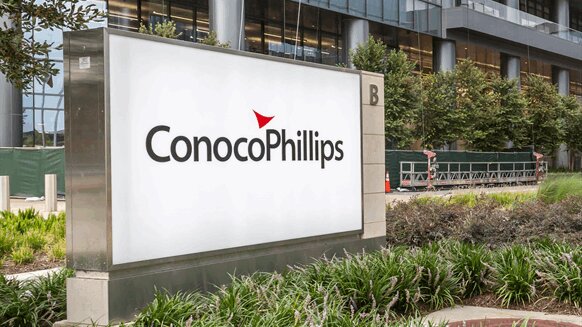The rising demand for Qatari oil and gas, coupled with the 2022 FIFA World Cup, is set to reflect on the Gulf state’s economic growth.
QatarEnergy named ConocoPhillips as its third and final partner in the North Field South (NFS) project on Sunday, granting it a 6.25% stake.
Qatar’s Minister of State for Energy Affairs Saad Sherida Al-Kaabi, also QatarEnergy’s CEO, announced the latest major partnership in a ceremony in Doha.
Chairman and Chief Executive Officer Ryan Lance of ConocoPhillips was also in attendance, following a meeting with Qatar’s Amir Sheikh Tamim bin Hamad Al Thani earlier on the same day.
ConocoPhillips is joining Shell and TotalEnergies in the NFS project, the second part of Qatar’s mega liquified natural gas (LNG) expansion project. The North Field expansion is set to further catapult the Gulf state as a top producer of LNG.
QatarEnergy began looking into potential partners in 2019 for the project, with production expected to start before the end of 2025.
Last week, QatarEnergy named Shell as its second partner and granted it a 9.375% stake after TotalEnergies at 9.375%.
Earlier this year, QatarEnergy concluded the signing of contracts with five global companies for the first part of the $28.75 billion project, known as North Field East (NFE). The companies include Shell, ExxonMobil, ConocoPhillips, Eni, and TotalEnergies.
The NFE is set to boost Qatar’s production from 77 million to 110 million tonnes per annum (mtpa) by 2025. The second part is expected to increase Qatar’s LNG production capacity from 110 to 126 mtpa by 2027.
Discovered in 1971, the North Field covers an area of 9,700 square kilometers, of which 6,000 square kilometers are in Qatar’s territorial waters.
The production then kickstarted in 1989, during the time in which oil was the primary source for Qatar’s wealth.The Gulf state now has the world’s third-biggest proven natural gas reserves.
Recent market forecasts have signalled a hike in the Gulf state’s energy sector, with a rising demand for Qatari gas amid the ongoing Russian invasion of Ukraine.
Qatar’s economic growth
The rising demand for Qatari oil and gas, coupled with the 2022 FIFA World Cup, is set to reflect on the Gulf state’s economic growth.
The International Monetary Fund predicts that the economy is set to expand by 5.4% this year, with a surplus of roughly $45 billion.
Qatar’s gross domestic product in the first half of this year alone spiked by 4.3% coupled with a 7.3% growth rate of the non-oil sector, in comparison to the same period in 2021.
“The hike in energy prices turned a projected budget deficit at the beginning of the year into a surplus of QAR 47.3 billion in the first half of the year,” Qatar’s Amir Sheikh Tamim bin Hamad Al Thani told the Shura Council last week.
Qatar’s annual inflation rate reached 4.6% in the first half of the year, which the amir said is lower than global figures thanks to necessary measures taken by the Gulf state to reduce it.
“Qatar has also occupied an advanced global position at the food security level, as a result of implementing the national strategy for food security through several strategic productive projects,” said Sheikh Tamim.
The Qatari leader added that the expansion of its mega gas field “will have a significant impact on mitigating the repercussions” of the current energy crisis “in the short and medium terms.”







